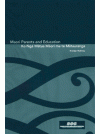This study was carried out to identify the aspirations and concerns of Maori parents/whanau regarding their children’s education, identify issues of Maori parents’/whanau participation and non-participation in their child’s education, and develop strategies to address concerns and issues, so that gaps between home and school could be positively addressed by Maori parents/whanau, teachers, principals, and boards of trustees.
Maori children attend English-medium schools, schools with a bilingual-unit, and kura kaupapa Maori. Six secondary schools, 4 primary, and 2 kura kaupapa Maori, both with wharekura (secondary level), took part in the study. Two of the 6 secondary schools had bilingual-units, while 4 offered Maori language as a subject; 2 of the 4 primary schools also had bilingual-units. All but one of the schools was situated in the Wellington region.
The field work was carried out between June 1998 and January 1999 by 3 Maori researchers who could conduct interviews in either Maori or English. Each of the 3 was responsible for particular schools and carried out all interviews related to those schools, so each researcher gained a real insight into the issues for each school. Students, teachers—primary and secondary, Maori and Pakeha—and parents were interviewed.
Purpose
The main aims of this research were to:
1. Identify the aspirations and concerns of Maori parents/whanau in relation to their children’s education.
2. Identify the issues surrounding Maori parents’/whanau participation and non-participation in their children’s education.
3. Develop possible strategies for addressing any concerns and issues, so that gaps between home and school can be positively addressed by Maori parents/whanau, and teachers, principals, and boards of trustees.

